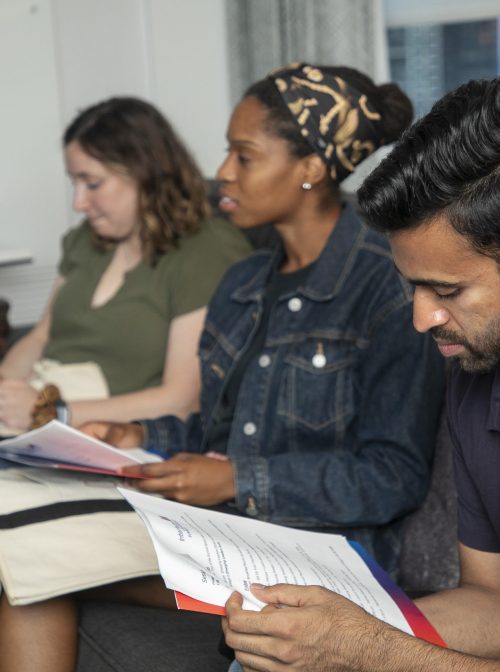An interfaith mentor sees the potential in you, even if you may not see it in yourself.
It was the first day of my internship at the World Health Organization (WHO) in Geneva, Switzerland. My supervisor asked me to compile all the research on a niche public health topic to send to a stakeholder in two hours. As an eager graduate student, I quickly agreed. I searched for resources online for an hour, only to realize that none existed. My intense excitement quickly turned into a panic.
Am I going to fail my first assignment? I wondered. Why did I agree to this timeline?
As my confidence was slowly declining, I messaged one of my close friends and interfaith mentors. I gave her a recap of the situation, with an emphasis on how important this internship was to me.
As interfaith leaders, we received training in active listening, conflict resolution, and communication. My interfaith mentor leveraged those skills immediately. She listened to my concerns, helped reframe the internal distress I was feeling, and instilled her confidence in my ability to do good work.
In that moment, my interfaith mentor played a pivotal role in helping me navigate my panic. Interestingly, we led interfaith efforts together, so I had built the same skills over the course of my interfaith training. However, it is easy to have a blind spot about your own abilities. That is why interfaith mentorship is vital. An interfaith mentor guides you along your interfaith leadership journey by providing you with support and feedback. An interfaith mentor sees the potential in you, even if you may not see it in yourself.
An interfaith mentor sees the potential in you, even if you may not see it in yourself.
Recently, I served as a mentor in Interfaith America’s Emerging Leaders Mentorship Program. I work in public health, and it was exciting to mentor incoming interfaith leaders in the same field. The field of public health exists to protect the health of all people and the communities they live, learn, work, and play in. For experienced interfaith leaders, we understand that the field of public health could not successfully do its job without community leaders equipped with interfaith leadership skills. However, to new interfaith leaders, it is not immediately apparent how they can employ those skills on a day-to-day basis.
As a mentor, I shared stories that connected my interfaith leadership to professional and public health experiences. For instance, during my time at the WHO, I sat on a team with members from different parts of the world, including Lebanon, the Philippines, Colombia, Japan, and more. As an interfaith leader, I had already built an internal radar screen for diverse identities. Which meant that I could notice how different worldviews were influencing the conversations, situations, and events around me. I could successfully facilitate conversations with my team while acknowledging their globally diverse viewpoints. By actively listening to their stories and finding common ground between their experiences, I strengthened the relationships among our team unit as well as created a safe space for the team to generate ideas about our work. As a result, we rooted our discussions about public health action in cultural sensitivity, interfaith literacy, and equity.
While this is only one example of leveraging interfaith leadership skills in professional and public health settings, there are many ways to do so. As a mentor, my goal was to help public health professionals approach their work using an interfaith perspective. I believe that interfaith cooperation is a vital component of a healthy society, and interfaith leaders help us get there.
This article was prepared by Suraj Arshanapally in his personal capacity. The opinions expressed in this article are the author’s own and do not reflect the view of the Centers for Disease Control and Prevention, the Department of Health and Human Services, or the United States government.
Suraj Arshanapally, MPH is a Health Communication Specialist for the Centers for Disease Control and Prevention. Suraj holds an MPH in Social and Behavioral Sciences from Yale University and a BS in Public Health from Saint Louis University. He believes that interfaith cooperation is a vital component to a healthy society and enjoys using his interfaith leadership skills to address public health issues. Suraj is a member of the Emerging Leaders Network for Interfaith America. With Interfaith America, he has previously served as a Better Together Coach, Interfaith Innovation Fellow, Emerging Leaders Mentor, and a trainer for the Interfaith Leadership Summit.




